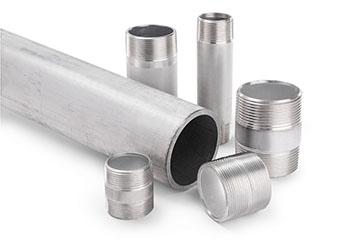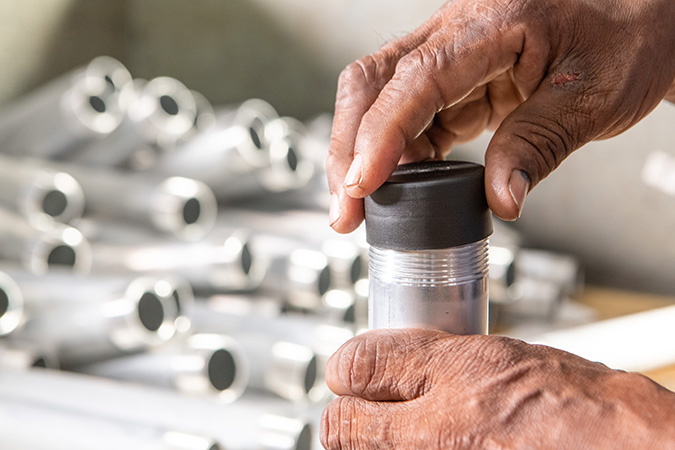If you're getting into some amount of industrial work, you may see calls for 6061 aluminum alloy. Used in a wide range of industries and applications, this strong metal provides flexibility missing in other aluminum alloys while still providing plenty of support. Popular due to its easy workability, it can be handled in a wide range of metalworking applications, such as welding, extrusion, and forging. It has superior corrosion resistance while remaining relatively affordable, providing a strong option for chemical handling equipment.
EXPLORE MERIT'S ALUMINUM OFFERING

The 6061 aluminum alloy is widely used, and when heat treated, can impact the size and dispersion of the magnesium and silicon within the metal matrix. It has high tensile strength and yield strength, works easily and has a high level of corrosion resistance. These qualities make it a good fit for many manufacturing, aerospace, automotive, housewares, and similar applications.
The numbering of “6061” aluminum has to do with the specific qualities of the alloy itself. Though it may seem like a random series of numbers, they have a specific meaning when you understand the numbering process, which includes the type and quantity of the alloy materials that are included with the aluminum. These materials provide specific qualities to the alloy that make it flexible, strong, and ready to tackle many different uses.
As one of the most widely used aluminum alloys, 6061 aluminum has good workability. At T6 temper, it has the highest yield strength in the 6061 aluminum alloy series at 240 KPa or higher, usually averaging around 270 KPa. It's commonly used in aircraft structure, partially due to the high tensile strength of 290 KPa or higher, typically averaging 310 KPa. Heat treatment impacts the temper, increasing strength while making it more workable.
Given the easy workability of the 6061 aluminum alloy, it's popular in non-commercial and military aircraft wings and fuselages, automotive parts, marine craft, flashlights, food packaging, scuba tanks, bicycle frames, sporting goods, firearms, ultra-high vacuum chambers, model aircraft and drones, amateur radio equipment, rescue ladders, and similar products. It's also commonly used in welding, though the temper must be restored through heat treated options to restore overall strength, as well as extrusions and forging.
One of the benefits of aluminum is its fast thermal transference. This makes it a popular option for a range of electronic parts, such as heat sinks that move heat away from more sensitive electronic components and dissipate it out of the machine. Its strength and light weight make it a popular option for furniture, especially more modern types. It also has good electrical conduction and is often used for higher-weight wires and cables, such as power transmission lines. However, it can corrode when exposed to copper, which is why special compounds must be used between the two metals to prevent this problem.
As we will get into below, the numbers that are used in these alloys do have significance. We'll discuss the 6061 aluminum alloy below, but for the moment, let's take a look at what the 7075 aluminum alloy means. The 7075 series has zinc as the primary alloy metal at 5.6%, with a 90% aluminum content. The remaining alloy metals include 2.5% magnesium, 0.23% chromium, and 1.6% copper. This mix provides significantly higher strength, but at a cost to the other aspects of the metal, especially in terms of corrosion resistance.
It's difficult to say which type of aluminum is better, because it will depend on your specific application. Generally speaking, 7075 aluminum has a larger amount of copper, which lowers its corrosion resistance compared to 6061 aluminum alloy. However, this flaw also makes it much stronger, reaching a yield strength nearly double that of 6061 at 503 MPa and a hardness of 150 compared to 6061's 95 on the Brinell scale. However, with this strength comes lower machinability, making 7075 aluminum alloy more difficult to work than the easy-working 6061 aluminum alloy, though both can be machined without too much difficulty. Both alloys are able to withstand being easily deformed while retaining the flexibility needed for resistance to shattering or cracking.

As with many standards, the numbers used in the 6061 aluminum alloy have particular meanings. The 6061 series of aluminum is represented by alloys containing silicon and magnesium, which provide a range of properties to the alloy to make it more workable, stronger or otherwise improve the blend. The 6061 aluminum alloy is a high-aluminum alloy, which makes it more workable and places it in the wrought classification. The last two digits in the series stand for the percentage of major alloy materials, representing 0.6% silicon and 1.0% magnesium. The 6061 aluminum alloy can also contain 0.2% chromium and 0.28% copper as a nominal mix. This leaves 97.9% aluminum in the formulation, providing a high level of strength.
Depending on the temper of the aluminum, it can be stronger than stainless steel. Specifically, the yield strength of T6 temper 6061 aluminum alloy is stronger than stainless steel of a similar thickness, due to the specific properties of the alloy and the temper. Combined with the light weight of 6061 aluminum alloy, it has become a popular option for vehicle frames to improve strength while reducing weight, as well as its many uses in marine craft, aircraft, and a range of similar applications. That being said, many aerospace firms for commercial and military applications have moved to different alloys for specific reasons, due to the particular qualities of those alloys and increased specialization of the builds that are being created for a range of applications.
As you can see, there are a wide range of reasons why 6061 aluminum alloy is the most popular aluminum alloy available on the market. At Merit Brass, we believe in providing you with the best materials in the industry to help improve your installations and overall performance of your systems. If you need help finding the perfect solutions for your 6061 aluminum alloy needs, our experienced team is standing by and ready to help with your project. Please feel free to contact us today with any questions, for more information, or to get a quote on your upcoming project.
SOURCES INCLUDE:
https://www.thomasnet.com/articles/metals-metal-products/6061-aluminum/
https://en.wikipedia.org/wiki/6061_aluminum_alloy#6061-T6
https://www.thomasnet.com/articles/metals-metal-products/6061-aluminum-vs-7075-aluminum/
https://www.ryerson.com/resource/the-gauge/grade-anatomy-aluminum-6061
https://www.theworldmaterial.com/al-6061-t6-aluminum-alloy/
3/28/2025 1:59:14 PM